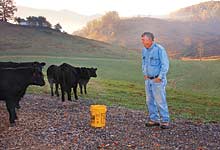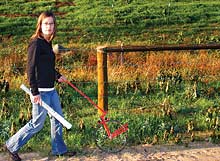As a boy, Don Whitner worked for 50 cents an hour on the farm across the hill. And he used to tell the farmer, Fred Rogers, that someday he was going to own the place himself. It took him a while, but Whitner eventually bought that piece of his past and has since added two more farms in the Newfound watershed in northwest Buncombe County—his lifetime home.

Accumulating three farms for continued agricultural use runs counter to the trend of acreage lost to development. But through his business, W&L Angus, Whitner is busy building up a breeding herd of registered Angus beef cattle on his 300 acres. “I’ve worked with beef cattle all my life,” he says.
The most recent property Whitner acquired on Rabbit Hound Road, an old dairy farm, included a degraded stream. Round Hill Branch dumps directly into Newfound Creek (which, in turn, flows into the French Broad River). And that’s how he got to know Julie Cahill of the Buncombe County Soil and Water Conservation District.
The agency works to protect soil and improve water quality across the county, whether on farmland, residential or business property. In the past year alone, it has funneled nearly $500,000 in state, federal and private grant money into a cost-share program that helps landowners implement projects to divert storm water, safely water livestock, and control flooding and erosion.
Given the current drought conditions both here and in other areas, there’s some irony in the fact that local soil-and-water conservation districts were created in the 1930s in reaction to the Dust Bowl (the very first district was organized in Anson County, N.C., in 1937). The idea was to depend on local people, who are the best judge of their own needs, in promoting soil-and-water conservation. Federal legislation enabled states to establish conservation districts governed by locally elected boards of supervisors.
Buncombe County’s six-member board is chaired by Gary Roberts; there are also five staff conservationists and educators, headed up by Director Gary Higgins (who’s worked for the agency for 24 years, 11 of them as director). These employees work closely with U.S. Department of Agriculture conservation staff (housed in the same building at 155 Hilliard St. in downtown Asheville) and with the N.C. Department of Environment and Natural Resources’ Division of Soil and Water Conservation.
In the past year, the conservation district has worked on various cost-sharing projects as well as countywide planning to conserve natural resources. But Higgins says he’s been particularly pleased with the Newfound Creek Watershed Project, which focuses on the still significantly rural 22,190-acre drainage basin northwest of Asheville.

In 1998, Newfound Creek landed on what Cahill calls the “naughty list”—severely impaired and impacted streams that are cleanup priorities for both the N.C. Division of Water Quality and the U.S. Environmental Protection Agency. In 2004, a $415,000 grant from the state’s Clean Water Management Trust Fund targeted the watershed, and Cahill came in to manage the project. Two years later, the EPA allocated about $351,000 for additional water-quality work that’s still being done.
Cahill has held community gatherings to educate residents about both the problems and the resources available. Individual projects have included riparian buffers and stream-bank stabilization efforts aimed at improving water quality. But the critical conservation work comes at the landowner’s behest—not by governmental mandate. Landowners are responsible for either doing the work themselves or hiring someone else to do it. Cahill helps them plan the improvements and makes sure the work is completed satisfactorily before any reimbursement checks (typically covering 75 percent of the cost) are cut.
Having closely monitored the watershed, Cahill knew that the stream on Whitner’s newest farm was in serious trouble. The 2004 hurricane season had left significant stream-bank erosion, and cattle had access to the stream, causing both erosion and the high fecal-coliform bacteria content that has plagued the rural watershed for decades.
Cahill says Whitner was receptive to ideas for improving both his land and the health of his herd. Access to fresh, clean water, she notes, is “way better than having them drink from a stream. I have farmers say their cows are happier, healthier. They don’t have to give [their animals] as many antibiotics. There are a lot of benefits.”
In this case, providing that fresh water involved digging a 525-foot well and installing 3,200 feet of pipe to feed four watering stations. This will encourage the cattle to congregate in areas that won’t compromise the stream’s integrity. “Up until Julie came along,” says Whitner, “the cows drug seven-tenths of a mile from pasture to barn for water.” Whitner then fenced off the stream and, with guidance from Cahill, installed diversions to help channel floodwaters. He netted and seeded the worst of the banks, which are now green with soil-stabilizing growth. Whitner also installed a rough-surfaced, concrete cattle crossing to keep the animals out of the stream.
Showing visitors around the farm (accompanied by his working dog, Heidi), Whitner is obviously proud of his improvements—most of which he did himself.
“There can’t be enough good said about [Cahill],” he commented. “She really knows her job.”
“I’ve learned a lot about farming,” Cahill admits. “Just the amount of work that goes into [it], and the little return moneywise. But they all do it for the love and the passion.
“The biggest part of my job,” she adds, “is just educating anyone [about] the natural resources that they have, and how to get the most return out of them [while] keeping them sustainable. … Making sure [of] its highest quality, so you’re getting back—and keeping it that way for years to come. Same thing with water.”


Before you comment
The comments section is here to provide a platform for civil dialogue on the issues we face together as a local community. Xpress is committed to offering this platform for all voices, but when the tone of the discussion gets nasty or strays off topic, we believe many people choose not to participate. Xpress editors are determined to moderate comments to ensure a constructive interchange is maintained. All comments judged not to be in keeping with the spirit of civil discourse will be removed and repeat violators will be banned. See here for our terms of service. Thank you for being part of this effort to promote respectful discussion.